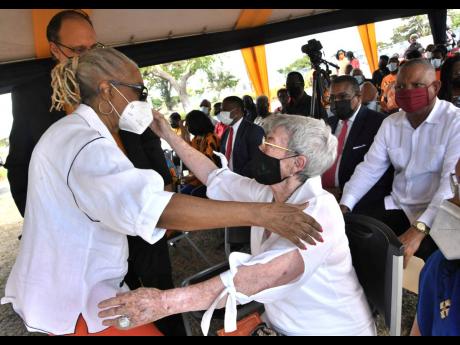Women lawmakers rapped for gender fight
Ahead of the global celebration of International Women’s Day on Tuesday, gender and development practitioner Judith Wedderburn has expressed disappointment with Jamaica’s women legislators, who she accuses of not doing enough to tackle fundamental disparities.
Wedderburn has also argued that even with the rise of women in key leadership positions, gender-based and sexual violence, poverty, and low-income jobs are among the persistent challenges that undermine those gains.
“I am very disappointed that we have so many more women in the House of Representatives and the Senate, and it’s like they don’t exist. What are the issues that they are following up on behalf of the women of Jamaica? I’m not hearing it,” Wedderburn told The Gleaner in an interview on Sunday.
Eighteen of the 63 members of parliament and eight of the 21 senators are women. The overall figure marks the first time in the history of the Jamaican Parliament that women represent more than 30 per cent of lawmakers.
Wedderburn still believes that women remain silent on key issues.
Legislators from the government caucus bore the brunt of her criticism as she insisted that collectively, they have not leveraged greater voice and power.
“One must ask what is happening inside of their party, especially the Government party, who has a majority of women. Why are they so silent? So one can assume that in that space of political leadership, women are not making any progress,” she said, noting that it is not only about numbers.
“You could have 40 per cent women in Parliament or the Senate, [but] if those women are not stepping up to the plate and speaking out in defence of women and in support of women and the many inequalities they face, why are they there?”
She said it raises the question of whether women in leadership facilitate other women.
While acknowledging the recent passage of the sexual harassment bill, Wedderburn said that that achievement has come after more than two decades of advocacy.
Government lawmakers Tova Hamilton, member of parliament for Trelawny Northern, and Senator Saphire Longmore declined comment when contacted on Sunday.
Meanwhile, Opposition Leader Mark Golding told The Gleaner that Jamaica has made “significant progress” in seeing women emerge as leaders.
He said this is evident even beyond the political arena, citing their rise in the judiciary and the public and private sectors.
“Generally across the economy, we’ve seen women emerging in positions of influence and power, and that’s a wonderful thing, but the truth of the matter is that there are still areas where women tend to be employed and at wages which are lower than the jobs that men tend to hold,” said Golding.
He said in that instance, legislation may not be the solution.
“It is more a question of providing opportunities for women and encouraging women to develop the skills necessary for them to feel welcome in those areas of the economy where they may be under-represented, especially in the areas of science and technology, where traditionally, men have been dominant, but where women have equal ability to thrive,” he noted.
“It just is a question of providing them with encouragement and support.”

